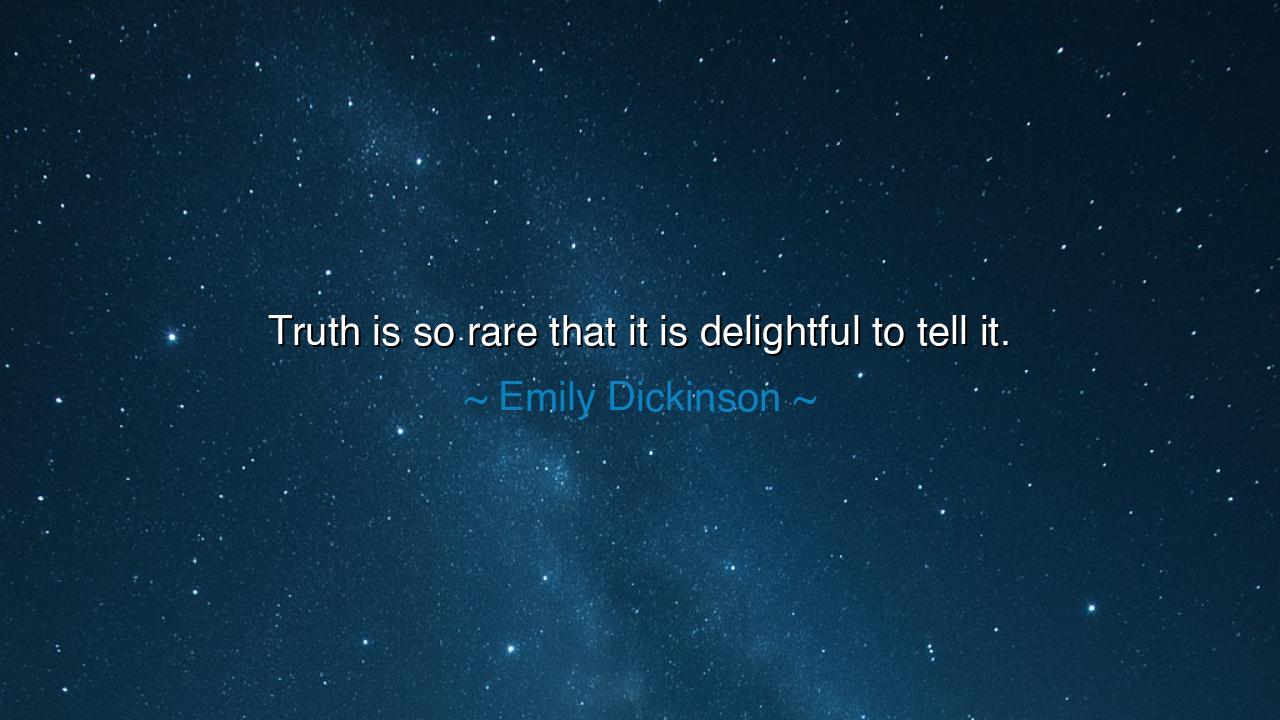
Truth is so rare that it is delightful to tell it.






Hear the piercing words of Emily Dickinson, recluse of Amherst and prophetess of the quiet soul: “Truth is so rare that it is delightful to tell it.” In this brief confession lies both sorrow and joy. Sorrow, that truth—the most sacred treasure of speech—is seldom spoken among men. Joy, that when it is spoken, it bursts forth like a hidden spring, refreshing the heart that utters it and the ear that receives it. Dickinson knew well that society is clothed in veils: convention, politeness, pride, and fear. To tell truth is to tear through these veils, and because it happens so rarely, it feels like a gift of light breaking into darkness.
The meaning of this quote is both personal and universal. Dickinson speaks as one who lived in solitude, observing the world with a piercing inward eye. She saw how men twist words to flatter, to conceal, to defend illusions. In such a world, the rawness of truth becomes shocking, almost miraculous. To speak it is an act of courage, for truth often wounds before it heals. Yet it is also an act of delight, for it liberates the soul from the weight of pretense. Thus she reveals the paradox: truth is rare, because men fear it—but when told, it is delightful, because it frees.
The ancients too spoke of this rarity. Diogenes the Cynic walked through Athens with a lantern at noon, searching for an honest man. His act was both jest and indictment, declaring that truth among men was scarce, hidden beneath ambition and deceit. And yet, when truth was spoken—when Socrates confessed ignorance, or when prophets cried out against injustice—it struck the heart like lightning. It was bitter, but it was also strangely sweet, a delight born of recognizing something real amidst a sea of shadows. Dickinson’s words breathe the same eternal insight.
History also bears its testimony. Consider Abraham Lincoln, known for his blunt honesty. In a time when politics was rife with deception, his reputation as “Honest Abe” became a source of wonder. People trusted him, not because his truths were always pleasing, but because they were rare. And when he spoke of liberty, or confessed the nation’s sins, there was a deep delight in hearing words that rang with authenticity. His life proves Dickinson’s saying: when truth is rare, to hear it is like hearing music amidst noise.
But why is truth so rare? Because it is costly. It threatens pride, challenges power, and unsettles the comfortable. Lies soothe, half-truths flatter, silence preserves peace. Truth disrupts, offends, and demands change. Therefore men avoid it, dressing it in softer garments or ignoring it altogether. And yet, when someone dares to speak it plainly, even enemies feel its sting and its strange beauty. For in every soul there is a longing to touch what is real, however painful.
The lesson for us is clear: do not add to the silence of truth. Speak honestly, even when your voice trembles. For though rare, truth is a balm to the weary and a fire to the complacent. Do not fear its sharpness, for its sharpness is what makes it precious. Like Dickinson, delight in speaking what is real, knowing that in a world of shadows, even a single candle is cause for joy.
Practical is this path: examine your words—are they true, or merely easy? When tempted to flatter or conceal, remember the weight of rarity. Practice truth first with yourself, confessing what you fear to admit, and then extend it to others with compassion. For if truth is so rare that it is delightful to tell it, then let your life become one that multiplies its delight, speaking not to wound but to free. And in this, you will walk in the company of sages, prophets, and poets, carrying light into the darkness of the world.






HDHo Dat
Dickinson’s view on truth feels like a challenge to our modern way of communicating. With all the misinformation and ambiguity around us, truth feels like a precious rarity. Why is it so delightful to tell the truth when it’s so difficult to find in the first place? Could it be that truth has become an act of rebellion against the more comfortable lies we tell ourselves and others?
NMVy - 9/2 Nguyen Ngoc Minh
I find this quote to be an interesting commentary on how often we avoid the truth, yet when we do speak it, it feels like a release. Why do we find it so delightful to tell the truth, especially when it feels so rare? Could it be that we take joy in sharing the truth because it cuts through the clutter of lies and half-truths that surround us? How do we learn to embrace truth more often in our lives?
TLDoan Thi Thao Lam
Dickinson’s words suggest that truth is not only rare, but also something to be celebrated when it’s spoken. I’ve noticed that sometimes the truth, while important, can be uncomfortable to hear or share. What makes truth so delightful when it’s finally expressed? Is it the relief of honesty, or is it the satisfaction of revealing something people often hide? How can we create environments where truth is welcomed rather than feared?
TPLe Trong Phuc
Emily Dickinson's quote makes me reflect on how rare truth really is in today’s world. It’s almost as if truth is something we often shy away from or mask to fit into social expectations. But why is truth so rare? Is it because we are uncomfortable with it, or because it’s difficult to discern in the first place? Can we ever fully embrace the truth, or is it something we merely catch glimpses of?